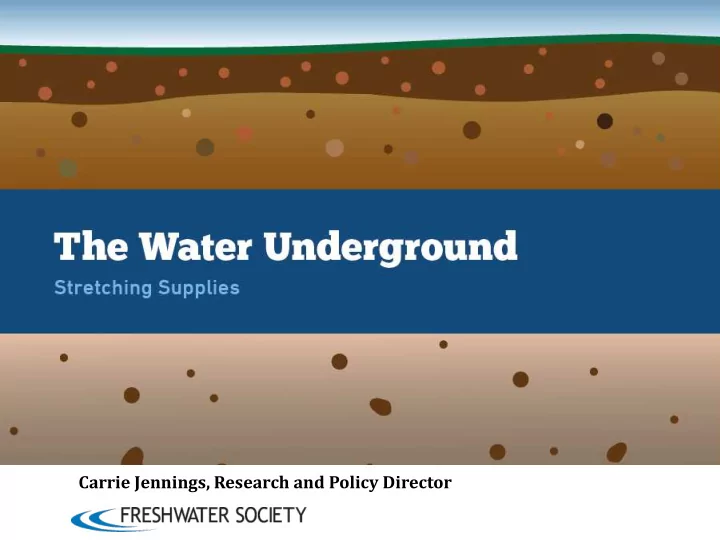

Carrie Jennings, Research and Policy Director
Reduce, Reuse, Recharge 1. Provide groundwater trends to cities 2. Reduce barriers for reuse & recharge 3. Use CW Funds and leverage Federal $
What are you drinking?
Is your groundwater : • Old? • Young? • Being replenished? • Diminishing?
What are Minnesota’s trends?
Who else do you share your water with?
Who else do you share your water with?
What else do you share your water with?
Who needs groundwater?
Why throw money down the drain? Reduce, Reuse and Recharge
Current state of regulations Roles of Regulators at Different Points of a Reuse System Source Capture/Storage Treatment Distribution End Use DLI regulates the drainage or MDH has broad authority over DLI regulates use within buildings MDH regulates injection wells, has collection from roofs and drinking water quality and public and drainage systems. controls on infiltration in vulnerable catchment systems. health but nothing specific about DWSMAs, ERAs, and some WHPAs. DNR regulates if volumes evaluating the safety of reuse Rainwater Not explicitly regulated collected/used >10,000 gallons per DLI requires backflow preventers to systems. day or one million gallons per year prevent cross-contamination with DLI has water quality treatment (some residential exceptions). potable water sources. requirements for rainwater. DLI administers plumbing MPCA regulates disposal of MDH requires graywater disposal MDH is involved only if the end use code, which governs the graywater as a component of to be certain distances from wells. is potable, as drinking water design and installation of wastewater, including specific standards would apply. DLI requires graywater and backup graywater systems as well as technical requirements for systems to be separated through DLI would require a variance for plumbing licensing septic tanks, pumps, dispersal in Lack of standardized treatment, plumbing code for piping, make-up uses in buildings. requirements; all graywater trenches, seepage beds, Graywater though DLI can set treatment water, backflow provisions, cross systems require a variance. mounds, at-grade systems. MPCA regulates discharge to surface requirements through variance. connections, testing requirements, waters and land discharge (including County or City issues permits DLI mandates that public sewer and setbacks. irrigation), issues guidance on reuse. for volumes < 10,000 gal/day. and water be used if available, requiring a variance for graywater projects. MPCA provides guidance in MDH is evaluating for the safety DLI regulates use within buildings MDH regulates injection wells and capture and storage of of common stormwater reuse (and has broad authority to infiltration in vulnerable DWSMAs, stormwater in the Stormwater installations. regulate stormwater conveyance ERAs, and certain WHPAs. Manual. systems, but does not regulate DLI requires backflow preventers irrigation systems unless combined and compliance with MDH well code Stormwater Not explicitly regulated with indoor use. to prevent cross-contamination. DNR regulates if volumes Stormwater use within buildings collected/used >10,000 gallons per requires a variance. day or one million gallons per year MPCA issues permits for stormwater (some residential exceptions). discharge and infiltration. MPCA regulates municipal and MPCA regulates the disposal of MDH requires wastewater disposal MPCA regulates discharge to surface industrial sources of wastewater including specific to be certain distances from wells. waters and land discharge (including Sources of Reuse Water wastewater. technical requirements for irrigation), issues guidance on reuse. MPCA regulates municipal and septic tanks, pumps and County or City issues permits industrial disposal to surface MDH applies drinking water dispersal in trenches, seepage for volumes < 10,000 gal/day. waters, subsurface, and land. standards to potable end uses; a Lack of standardized treatment, beds, mounds, or at-grade variance would be needed for Wastewater though DLI can set treatment DLI would require a variance systems. Metropolitan Council permits any aquifer injection. requirements through variance. for all wastewater systems. discharge to the metro system DLI mandates that public sewer (many large cities/sanitary districts DLI requires a variance for use in and water be used if available, also have this authority). buildings, and upholds MPCA design requiring a variance for requirements. wastewater projects. DLI regulates wastewater piping within buildings and property lines. USEPA involved in aquifer injection.
How can you help?
Reduce, Reuse, Recharge 1. Provide groundwater trends to cities 2. Reduce barriers for reuse & recharge 3. Prioritize CW Funds & leverage Fdl $$
Carrie Jennings, Research and Policy Director
Recommend
More recommend